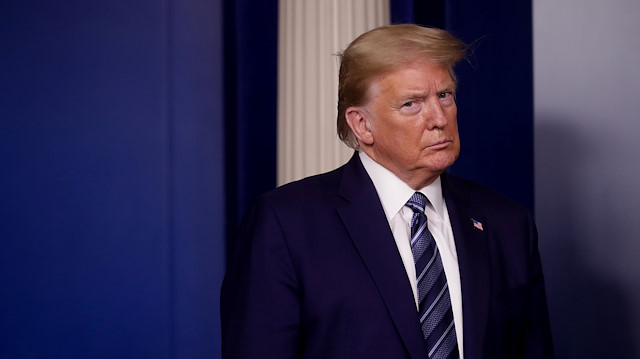

U.S. President Donald Trump
Executive order suspends legal permanent immigration to country for at least 60 days
U.S. President Donald Trump said Wednesday he will sign the executive order halting all legal permanent immigration to the U.S. for at least 60.
"I will be signing my Executive Order prohibiting immigration into our Country today," Trump said on Twitter. "In the meantime, even without this order, our Southern Border, aided substantially by the 170 miles of new Border Wall 27,000 Mexican soldiers, is very tight -- including for human trafficking!"
The president mentioned the suspension of legal immigration firstly on Monday, saying Washington has to protect Americans who have lost their jobs during the pandemic.
"By pausing immigration, we'll help put unemployed Americans first in line for jobs as America re-opens," Trump told reporters on Tuesday during his now-daily news conference.
"It would be wrong and unjust for Americans laid off by the virus to be replaced with new immigrant labor flown in from abroad. We must first take care of the American worker," he said.
Trump added that after the initial 60-day period mandated by his executive order expires, he will determine whether additional time is needed.
The order will only apply to those seeking permanent residency, meaning green card-seekers, but will not apply to those seeking U.S. entry temporarily, the president said. But he later acknowledged that he is considering a secondary order that could further narrow eligibility for U.S. entry.
"As we move forward, we'll examine what additional immigration-related measures should be put in place," he said.
Thousands of Americans have lost their jobs amid the pandemic as various state governors have ordered non-essential businesses to halt operations, and many businesses deemed essential are operating on a reduced basis.
Unemployment claims have continued to skyrocket each week with some 22 million Americans without jobs.
The U.S. leads the world in the number of coronavirus infections and deaths with more than 825,000 cases as well as over 45,000 fatalities and 75,600 recoveries.
Since the virus emerged last December in the Chinese city of Wuhan, it has spread to at least 185 countries and regions.
There are more than 2.58 million confirmed infections globally and almost 178,500 deaths.
#Coronavirus
#Donald Trump
#executive order
#immigration
#US

